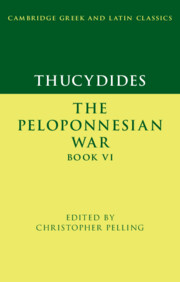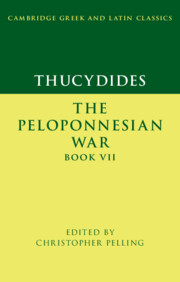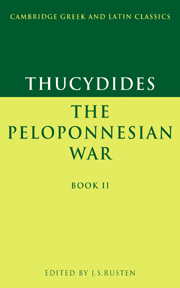Thucydides: The Peloponnesian War Book VI
In Books 6 and 7 Thucydides' narrative is, as Plutarch puts it, 'at its most emotional, vivid, and varied' as he describes the Sicilian Expedition that ended so catastrophically for Athens (415–413 BCE). Book 6 features tense debates both at Athens, with cautious Nicias no match for risk-taking Alcibiades, and at Syracuse, with the statesmanlike Hermocrates confronting the populist Athenagoras. The spectacle of the armada is memorably described; so is the panic at Athens when people fear that acts of sacrilege may be alienating the gods, with Alcibiades himself so implicated that he is soon recalled. The Book ends with Athens seeming poised for victory; that will soon change, and a sister commentary on Book 7 is being published simultaneously. The Introduction discusses the narrative skill and the part these books play in the architecture of the history. Considerable help with the Greek is offered throughout the Commentary.
- Guides the reader through the first part of one of the most crucial and dramatic episodes in Thucydides' History: the Sicilian Expedition
- The Introduction helps the reader appreciate the narrative skill of the book and its place within the architecture of the wider work
- The Commentary provides undergraduate-level students with considerable help with understanding the Greek
Reviews & endorsements
‘Book 6 is beautifully written, packed with self-contained information about the text and citations of the secondary scholarship.’ Gregory Crane, Tufts University, Bryn Mawr Classical Review
‘… Pelling provides us with a significant piece of work, all the more so because of his close focus upon literary matters, in which he excels. He is in full control of the text, its grammar and syntax, major and minor themes, and the enormous secondary literature that afflicts the scholar trying to explicate Thucydides’ rhetorical genius.’ Hunter R. Rawlings III, Histos
‘Anyone reading Thucydides’ books VI and VII can, perhaps even should, benefit from the deep knowledge of and understanding for the text Pelling displays.’ Jan P. Stronk, Exemplaria Classica
‘The Introductions serve as warm and erudite welcomes into a text often represented as cold and formidable. … The commentaries are extremely rich … Pelling’s volumes facilitate greater access to Thucydides, while his insightful readings demonstrate the way that Thucydides’ authorial choices leave the reader with a sense of the tragedy of the Peloponnesian War.’ Rachel Bruzzone, Bryn Mawr Classical Review
Product details
March 2022Paperback
9781316630211
370 pages
215 × 138 × 21 mm
0.47kg
Available
Table of Contents
- Introduction
- Deviations from Alberti
- Sigla
- THUCYDIDES: THE PELOPONNESIAN WAR BOOK VI
- Commentary
- Bibliography
- Indexes.





